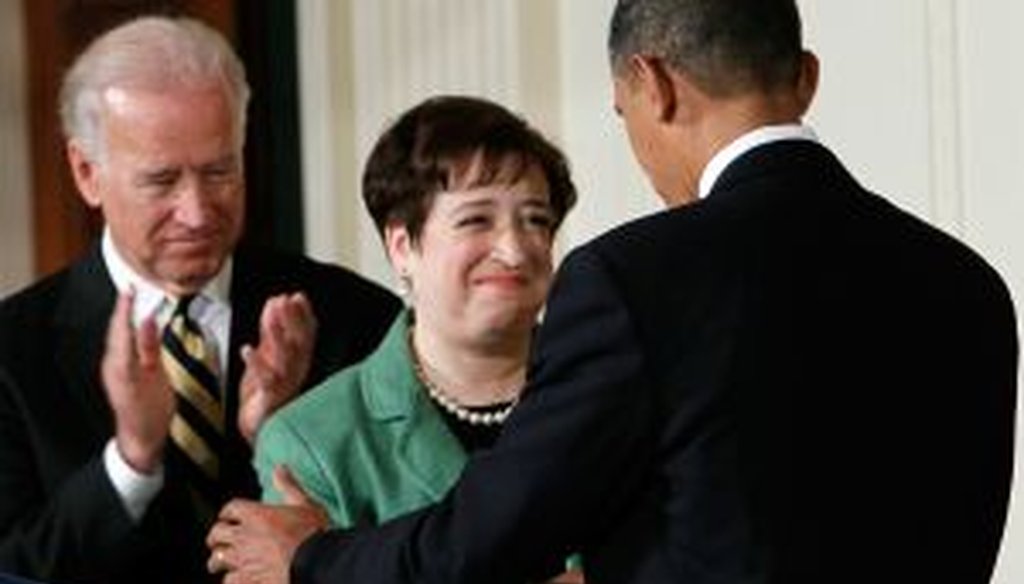Stand up for the facts!
Our only agenda is to publish the truth so you can be an informed participant in democracy.
We need your help.
I would like to contribute

Vice President Joe Biden and President Barack Obama with Supreme Court nominee Elena Kagan at a White House ceremony.
The political world didn't wait until President Barack Obama nominated Solicitor General Elena Kagan to the Supreme Court. With speculation running high over the past few weeks that she would be picked, they've been critiquing her nomination for days.
We'll be fact-checking the claims over the coming weeks and will post our Truth-O-Meter items on a special page devoted to the nomination and updating this story with links to those items. In the meantime, we wanted to provide some facts on Kagan and give you a quick summary of the initial debate about her nomination.
Kagan is quite familiar with the U.S. Supreme Court because as Obama's solicitor general, she represents the the U.S. government in cases before the court and decides which legal arguments the government will present. The job is so important that legal experts sometimes refer to the solicitor general as the tenth justice.
Kagan, 50, was born and raised in New York City, and attended Princeton University and Harvard Law School. After law school, she clerked for Supreme Court Justice Thurgood Marshall, a celebrated defender of civil rights. She also worked in private practice and taught at the University of Chicago Law School before joining the administration of President Bill Clinton in 1995. She served Clinton as an associate White House counsel and then a domestic policy adviser, and Clinton then nominated her to the U.S. Court of Appeals near the end of his term. But Republicans controlled Congress at the time, and her nomination didn't receive a vote before Clinton left office, so she was never seated.
Kagan taught at Harvard Law School starting in 1999. In 2003, she was named the law school's dean. Kagan has been praised for improving morale by doing little things like giving students free coffee and bigger things like hiring prominent legal scholars.
In 2009, Obama tapped Kagan to be his first solicitor general, and she was confirmed 61-31 by the Senate. She was supported by Democrats and a handful of Republicans. The GOP supporters included Tom Coburn of Oklahoma, Susan Collins of Maine, Judd Gregg of New Hampshire, Orrin Hatch of Utah, Jon Kyl of Arizona, Richard Lugar of Indiana and Olympia Snowe of Maine.
Lindsay Graham, R-S.C., a prominent member of the Judiciary Committee, did not vote; we asked his press secretary if he supported or opposed her confirmation as solicitor general, but did not receive a response. In April 2010, Graham was asked what he thought of Kagan as a potential nominee. Graham said of Kagan "I like her," adding "and that might hurt her chances."
Since she was confirmed as solicitor general on March 19, 2009, Kagan has argued six cases before the Supreme Court. The court has yet to announce how it will rule in four of the cases, while the government won one case and lost one. The win was Salazar vs. Buono, which allowed a large cross to remain at the Mojave National Preserve.
The loss was Citizens United vs. Federal Election Commission, in which the Supreme Court reversed laws setting limits on how much corporations could spend on elections, a decision Obama has publicly criticized several times. The vote was 5-4; Kagan would replace Justice John Paul Stevens, who wrote a blistering dissent for the minority in the Citizens United case.
The criticism of Kagan so far has involved several areas:
• Her lack of judicial experience and an extensive body of legal writings. In recent years, Supreme Court nominees have tended to be federal judges, which meant that they usually had written many legal opinions for public scrutiny. Kagan is a departure from this trend, and her legal writings are relatively minimal. Interestingly, this will likely draw criticism from across the political spectrum. Republican senators will no doubt attempt to draw out Kagan's views on controversial issues. On the other hand, those who want a more liberal court, most notably civil rights attorney and blogger Glenn Greenwald, have expressed skepticism about Kagan's lack of a track record and raised concerns that she will take the court in a more conservative direction.
• Her high-profile role in Harvard Law School's stand against "Don't Ask, Don't Tell." Harvard was one of several top-tier law schools that attempted to ban military recruiters from campus because of the policy that prevented gays and lesbians from serving openly in the military. Congress threatened to yank federal funding for schools that banned military recruiters through a measure known as the Solomon Amendment, and the issue came to the Supreme Court in 2004. Kagan signed onto a brief filed by Harvard law professors, which argued that the federal government should not be able to withhold funding if the schools applied the same policies to all recruiters. Harvard, for example, required all recruiters to sign forms indicating they would not discriminate against applicants based on sexual orientation. The Supreme Court, however, resoundingly rejected the universities' arguments on an 8-0 vote.
• Her hiring record at Harvard. Some liberals have criticized Kagan for not hiring many minorities and women while she was dean at Harvard. Conservatives too have attacked her hiring record; they say Kagan has received more credit than she deserved for hiring and working with conservative law professors.
It will probably be weeks before Kagan finishes confirmation hearings and receives a vote. We'll be poised to fact-check the claims.
You can read our previous checks of Obama's first nominee, Justice Sonia Sotomayor, or review all of our fact-checks about the U.S. Supreme Court.
Our Sources
U.S. Department of Justice, Elena Kagan, Solicitor General, accessed May 6, 2010
U.S. Senate, On the Nomination (Confirmation Elena Kagan, of Massachusetts, to be Solicitor General ), March 19, 2009
Boston.com, Crimson tide:Harvard Law School, long fractious and underachieving, is on the rise again - and shaking up the American legal world, Oct. 19, 2008
Harvard Law Bulletin, Timeline of a school’s transformation, 2002 - 2009, accessed May 6, 2010
The Oyez Project, Rumsfeld v. Forum for Academic and Institutional Rights (FAIR) , 547 U.S. ___ (2006), accessed May 6, 2010.
Amicus brief submitted by Harvard Law School Faculty, Rumsfeld v. Forum for Academic and Institutional Rights (FAIR), 2004
SolomonResponse.org, Documents Related to FAIR v. Rumsfeld, May 6, 2010
SCOTUSblog, On October 4, 2010, Elena Kagan Will Ask Her First Question As A Supreme Court Justice, Feb. 23, 2010
The Daily Princetonian, Reserved passion: Kagan ’81, May 3, 2010
Glenn Greenwald, The case against Elena Kagan, April 13, 2010
The Hill, Graham on potential court pick Kagan: 'I like her', April 13, 2010















































